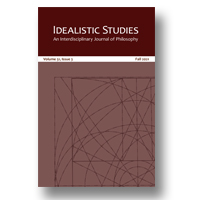|
1.
|
Idealistic Studies:
Volume >
51 >
Issue: 2
Ryan J. Johnson, Nathan Jones
Notes of a Wayward Son:
Hegel, Baldwin, and Antiracist Idealism
abstract |
view |
rights & permissions
| cited by
This paper transforms elements of Hegel’s thought into antiracism through the work of James Baldwin in three Acts. Act One offers a Hegelian Account of Honesty that is structurally inspired by “conscience” from his Phenomenology of Spirit. Honesty has two, seemingly paradoxical, dimensions. To address the unacknowledged whiteness in Hegel, we turn to Baldwin in Act Two. Baldwin deepens and problematizes Hegelian Honesty through a conceptual diagnosis of “double misrecognition”: the first is the misrecognition of Blackness as inferior, the second is the misrecognition of whiteness as superior. Act Three articulates how the structure of whiteness forecloses Schuld and shame by connecting this dual foreclosure to the two dimensions of Hegelian honesty and Baldwin’s diagnosis of double misrecognition. We conclude by formulating a sketch of “antiracist idealism” as version of what the Germans call Vergangenheitsaufarbeitung, that is, doing the hard, uncomfortable labor of comprehending how the present is not separate from but completely composed of old scars, wounds, violence, and atrocities. Antiracist idealism enables us to both learn from yet also challenge canonical idealism through contemporary forms of antiracism.
|
|
|
2.
|
Idealistic Studies:
Volume >
51 >
Issue: 2
Manuel Tangorra
Hegelian Heritage and Anti-Racist Horizons:
Exegesis and Rewritings of Dialectical Thought
abstract |
view |
rights & permissions
| cited by
The task of confronting Hegel with the conflicts of our present proves to be indispensable to keep alive the critical scope of dialectics. In a context marked by a new wave of movements that challenge the racist structures that inform our societies, the question of the contribution of Hegelianism to an anti-racist thought takes a significant relevance.The hypothesis of this article argues that it is possible to distinguish two different operations that shape an anti-racist critique with the resources of Hegelian dialectical thought. The first one is constituted by the exegetical practice aiming to identify, within Hegel’s own discourse, a speculative core that allows the definitive overcoming of all ethno-racial particularisms through the postulation of a normative universal horizon. Such interpretative perspective, shared by numerous scholars, seeks the absorption of Hegel’s racist and Eurocentric assertions in the larger and global scope of his system. Once the limitation of this option is shown, we will examine an alternative operation, namely, the rewritings of the dialectical thought in certain philosophical reflections arising from the concreteness of anti-racist movements. To that extent, we will revisit the proposals of W.E.B Du Bois and Frantz Fanon as peripheral enunciations of the dialectic that enable a new understanding on the subjectivation processes and liberation horizons of racialized communities.
|
|
|
3.
|
Idealistic Studies:
Volume >
51 >
Issue: 2
Kimberly Ann Harris
Du Bois and Hegelian Idealism
abstract |
view |
rights & permissions
| cited by
In a crossed-out section in his Fisk University commencement address on Otto von Bismarck, W. E. B. Du Bois mentions that Hegel was one of the figures that influenced him early on in his intellectual development. I argue that although Du Bois uses Hegelian language and employs a Hegelian conception of history in his address “The Conservation of Races,” he abandons both in his essay “Sociology Hesitant.” He became critical of the teleological conception of history because it rests on determinism, which in his view denies the possibility for social change. With what I call his “mystical holism,” Du Bois is at odds with Hegel’s methodological holism, a distinguishing characteristic of absolute idealism. Du Bois’s dynamic idealism, which grows out of opposition to Hegelian idealism, leaves us with hope for a world without racism or at the very least in a better position to develop idealism as an anti-racist system of philosophical thought.
|
|





